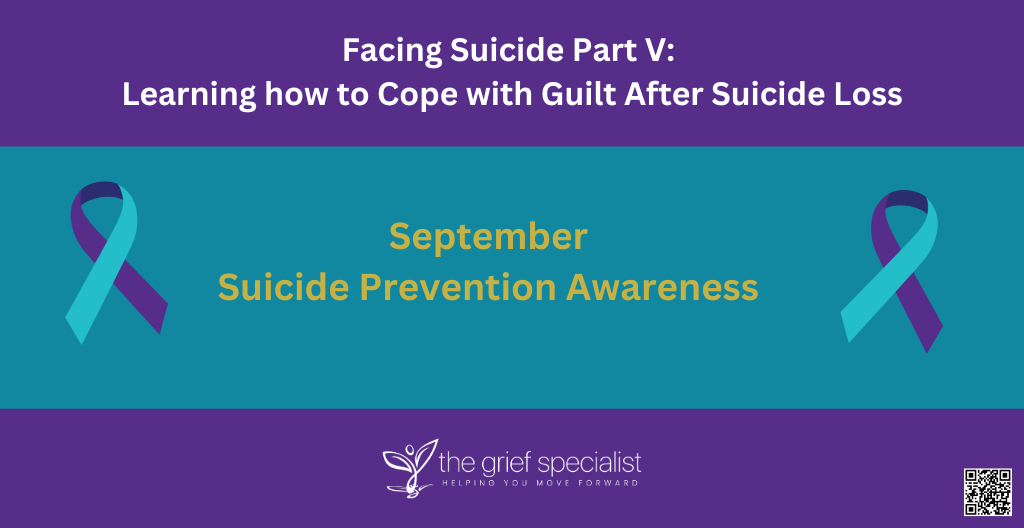Losing a loved One to Suicide
It is very likely that you’re a suicide loss survivor. Research indicates that for each of the thousands of people who died by suicide, they each leave behind an average of 6 to 10 survivors – spouses, parents, children, relatives, and friends who are devastated by the death. I know because I am a parent survivor, relative survivor, sibling survivor and friend survivor. It has forced me to learn how to adapt and learn coping skills.
This is Part V of Facing Suicide, learning to cope with guilt. In Parts I and II, you learned about suicide. After my 24-year-old son took his life, I needed to know more about suicide. Part III was about the warning signs of suicide with practical and actional tips on how to help those who are suicidal. Part IV was dedicated to identifying signs and symptoms that affect four areas of your health.
Why is Losing Someone to Suicide so Uniquely Painful?The death someone you care about, and love can be painful, no matter how they died. However, suicide grief is complicated and different than other kinds of grief. The act of intentionally ending one’s life by gunshot, hanging, drugs and jumping from tall places are brutal and vicious ways to end one’s life. Survivors might even be asked to identify the body, may have found them, or might have to engage with the police. This and so much more can leave a survivor with so many questions. These are reasons why suicide grief is a type of grief like no other, making the loss unfathomable and traumatic.
Many cultures or religions condemn suicide. It can be considered an unforgiveable sin and a forbidden act that prohibits entry into the afterlife. There is a stigma associated with this type of death for both the person who died and those left behind.
Suicide triggers a vast range of emotions: sadness, anger, guilt, shame, and loneliness. Survivors felt they should have prevented the death, they should have had known what was going to happen and they should have been a better parent, friend, spouse, or sibling. These feelings and emotions are common however, we can take away the “should haves” for we have no control of what others think, say and ultimately do. What we do have control over is our reaction and response to what has happened to us.
In this last and final part, Part V, you will learn how to cope with guilt after suicide loss.
Guilt
You think you could have done something to stop them, done things differently or said something to keep them alive. This is guilt associated with information that is too terrible to tell – they died by suicide.
You might be thinking you should have done more to help them. Remember, you were doing your best with what you knew at the time of your loved one’s death. In hindsight, it is easy to get trapped in the “shoulda” mentality.
Suicide is a choice albeit one as a survivor that you do not like. Your loved one was in pain and suffering. They wanted to end the pain and suffering and their only solution they could see was to end their life. Your loved one was old enough to think, speak and act on their own. You did not have control over them.
Think of yourself standing in the middle of a hula-hoop that was placed on the floor. You have control over what is within the hula-hoop – and that is you and you alone. You can only speak from your mouth, you can only think your thoughts and you can only take action for your body. This is a difficult concept to understand. You must focus on what you can control. When the thoughts come into your mind that you had control over your loved one, turn your thoughts to what you have control over – you. Stand in the hula-hoop.
You may feel guilty due to your emotions. With homicide, survivors can direct their anger at the perpetrator. In the case of suicide, the person who died by suicide appears to be a victim of mental illness, pain, suffering and intolerable circumstances. Their suicide may seem like an attack, act of vengeance or retaliation towards those left behind. Feelings of anger, rejection and abandonment may be mixed with great sadness and deep grief. Understand that it is okay to experience these mixed emotions. However, do not let the feelings towards the person who died linger. They will get in the way of your own personal healing.
When my son died, I had these same emotions. I worked through them by forgiving him. Yes, I forgave him for taking his life, ending his pain and suffering. That was his solution. That is what he saw as his way out. I could not judge him for I have not had pain that was too great to bear. I often ask myself, “If I were in his shoes, would I choose suicide?” I can’t answer that question nor can you.
Support
I recommend that you get support and do not walk this journey alone. It is a rough one. You can get support at any time: soon after the death, long after the suicide or special days such as holidays, birthdays, or the anniversary of their death.
Reach out to me, schedule a consultation to get the support you need. Clients find they have hope to live, love, and laugh again. Coaching – The Grief Specialist
#suicidepreventionawarness
#guilt
#mentalhealth
#survivor
#livelovelaugh
#suicide




